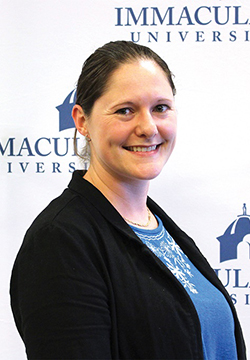Erin Kirschmann, Ph.D.


Title: Associate Professor
Department: Psychology and Counseling
Office: 340 Loyola Hall
Phone: (610) 647-4400 Ext: 3291
Email: ekirschmann@immaculata.edu
Education:
Ph.D. in Neurobiology, University of Pittsburgh
B.A. in Psychology, Elizabethtown College
BIOGRAPHY:
Dr. Kirschmann is a Neuroscientist who enjoys finding the parallels between neuroscience and psychology. Her research interests include understanding adolescence as a unique time period of resilience and vulnerability, investigating the emergence and stability of cognitive and emotional traits, and examining the impact of stress across multiple domains.
After earning her doctorate in neurobiology from the Center for Neuroscience at the University of Pittsburgh, she completed three years of postdoctoral training in the Department of Psychiatry. There, she utilized rodent behavior models and biochemical analyses to investigate the effects of adolescent cannabinoid use on later cognitive function. Dr. Kirschmann loves to share the importance of research and critical thinking with her students; she is also interested in ways to improve her own teaching practices to promote active learning and educational engagement.
Courses Taught:
- FYS 100 First-Year Seminar – Psychology in Pop Music: Health & Wellness Issues
- PSY 101 Foundations in Psychology
- PSY 311 Brain and Behavior
- PSY 313 Experimental Psychology I
- PSY 314 Experimental Psychology II
- PSY 360 Learning and Cognition
- PSY 418 History of Psychology
- PSY 419 Contemporary Research Issues
Research Interests:
Dr. Kirschmann is interested in the following topics: adolescence, stress, individual differences, cognition, behavioral neuroscience, motivation, and cannabinoids.
Publications:
Kriebel, D.K., Kirschmann, E.K., Cuddy-Casey, M., Madanat, S. (2020). Evaluation of undergraduate psychology capstone courses in Southeastern Pennsylvania and surrounding areas. In H. Scherschel and S. Baker (Eds.). Teaching Tips: A Compendium of Conference Presentations on Teaching, 2018-19. (pp.42-43). Retrieved from the Society for the Teaching of Psychology website: http://teachpsych.org/ebooks/teachingtips4.
Kirschmann, E.K., Pollock, M.W., Nagarajan, V., Torregrossa, M.M. (2019). Development of working memory in the male adolescent rat. Developmental Cognitive Neuroscience 37, Article 100601. https://doi.org/10.1016/j.dcn.2018.11.003.
Kirschmann, E.K.*, McCalley, D.M.*, Edwards, C.M., Torregrossa, M.M. (2017). Consequences of adolescent exposure to the cannabinoid receptor agonist WIN55,212-2 on working memory in female rats. Frontiers in Behavioral Neuroscience, 11, Article 137. https://doi.org/10.3389/fnbeh.2017.00137.
Kirschmann, E.K., Pollock, M., Nagarajan, V., Torregrossa, M.M. (2017). Effects of adolescent cannabinoid self-administration in rats on addiction-related behaviors and working memory. Neuropsychopharmacology, 42(5), 989-1000. https://doi.org/10.1038/npp.2016.178.
Kirschmann, E., Pollock, M., Nagarajan, V., Torregrossa, M.M. (2016). Addiction-like and cognitive effects of adolescent cannabinoid self-administration in rats. Presented at 2016 College on Problems of Drug Dependence conference, Palm Springs, CA.
Kirschmann, E.K.Z., Mauna, J.C., Willis, C.M., Foster, R.L., Chipman, A.M., Thiels, E. (2014). Appetitive cue-evoked ERK signaling in the nucleus accumbens requires NMDA and D1 dopamine receptor activation and regulates CREB phosphorylation. Learning and Memory, 21(11), 606-615. https://doi.org/10.1101/lm.035113.114.
Wang, J., Eslinger, P.J., Doty, R.L., Zimmerman, E.K., Grunfeld, R., Sun, X., Meadowcroft, M.D., Connor, J.R., Price, J.L., Smith, M.B., Yang, Q.X. (2010). Olfactory deficit detected by fMRI in early Alzheimer’s disease. Brain Research, 1357,184-194. https://doi.org/10.1016/j.brainres.2010.08.018.
Zimmerman, E.K., Eslinger, P.J., Simmons, Z., Barrett, A.M. (2007). Emotional perception deficits in Amyotrophic Lateral Sclerosis. Cognitive and Behavioral Neurology, 20(2), 79-82. https://doi.org/0.1097/WNN.0b013e31804c700b.